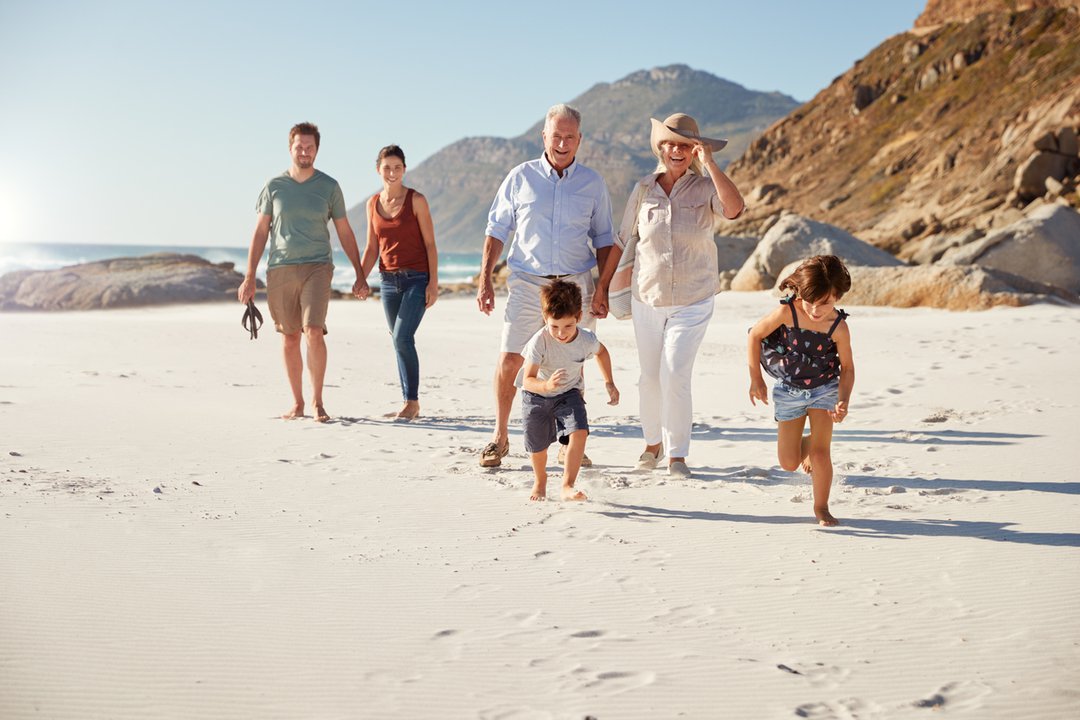
Travel consultant Marcia Proctor is suddenly getting a lot of calls from families looking to book intergenerational vacations.
For example, she recently organized a February getaway to the Dominican Republic for three families travelling together – each including grandparents, parents and kids.
“It’s a multi-family reunion,” she says.
After more than a year and a half with very few bookings due to the pandemic, Ms. Proctor, of Travel Agent Next Door Inc. in Toronto, is seeing many grandparents looking to travel with their adult children and grandchildren.

iStock-1162303350.jpg
Many want a respite from the isolation and loneliness from the past 19 months of pandemic restrictions and feel a need to reconnect with grandchildren they’ve watched grow up on Zoom calls.
According to Kiran Pure, a registered child psychologist from Dartmouth, N.S, multigenerational trips can be psychologically healing for seniors.
“Travelling with grandkids is valuable to build connection and continuity in the relationship through shared quality time together,” Dr. Pure says.
Still, the risks of COVID-19 remain, which means planning trips that are both safe and fun.
“In these times, travelling, like any activity which brings people together from different households, is not risk-free, even after individuals have been fully vaccinated,” Dr. Pure says. “For grandparents, it is important to weigh the risks and benefits to ensure that no one is at increased risk.”
Checking a destination’s COVID-19 caseload and mandates can be a good way of gauging its safety. And Dr. Pure recommends being fully vaccinated before travelling, as well as considering the health status of everyone taking the trip.
“For any family member who has a health issue, it’s important to ask their family doctor if travel is okay,” Dr. Pure adds.
Balancing multigenerational interests
With multiple generations – and often very different interests – it’s important to opt for a trip that can accommodate everyone’s preferences, Ms. Proctor says.
For instance, she says some families underestimate how much walking seniors might have to do at Disney World, or they don’t consider how full days of sightseeing can tire small children.
It’s why Ms. Proctor recommends a pre-trip analysis that considers factors like; how much walking there will be, if the hotel has an elevator, the size and location of the resort, and whether there are golf carts or other vehicles that can help people get around as needed.
“Choose a destination carefully and discuss it – make sure that there’s enough to do to entertain everyone,” she suggests. “Ask each person what they’d like to do on the trip.”
Ms. Proctor often recommends beach resort vacations since they offer a slower pace for seniors, while also providing younger travellers with a choice to participate in more active water sports or excursions.
“Not everyone will be doing ziplining,” she says.
Many resorts also offer kids’ clubs, which organize child-friendly activities and allow parents to savour some free time.
When it comes to foreign travel, the activities planned can make or break the vacation. While older children may not enjoy visiting museums, they may be excited at the prospect of visiting a toy-themed museum, amusement park or seeing a play.
Cruise lines can also accommodate a variety of needs, with less mobile family members able to take in performances and activities on board, while others go sightseeing off the ship during the day.
Many cruises now train staff on how to care for kids with special needs, Ms. Proctor says. They also provide a variety of foods to ensure everyone’s dietary restrictions are met.
Still, she advises multigenerational families to check the cruise line’s policies before booking. At the moment, some don’t allow kids under 12 to board since they’re not yet eligible to receive a COVID-19 vaccination. She recommends travellers contact a travel agent for the most updated information on COVID-19 restrictions.
Before booking any vacation, Ms. Proctor advises people to purchase cancellation insurance and health insurance. “There’s a special product now called COVID insurance,” she says. “It will apply if you test positive while on vacation.”
Managing expectations for family time
Although grandparents may idealize family vacations, they don’t always go to plan, warns Ms. Proctor. Often grandparents underestimate the changing moods of children and teens.
“Manage your own expectations for the trip,” Ms. Proctor says. “Teens aren’t going to want to spend every minute of the trip with their grandparents.”
Another common pitfall is confusion around babysitting duties, which adult children may expect of their parents while on vacation – without asking first.
“Have that discussion ahead of time,” Ms. Proctor says, to avoid any unpleasant confrontations.
Mealtime can also be complicated with multigenerational families, she says. While young children may have to eat earlier, other older family members may want to dine later in the evening. On her multigenerational vacation to Cuba, Ms. Proctor says her family would have separate mealtimes, reconnecting for dessert or drinks later in the evening.
Before booking a trip, it’s also a good idea to discuss who will be paying for what, Ms. Proctor adds, so there’s no misunderstanding when the bills come in.
Also, be prepared to pivot if plans change mid-vacation, Ms. Proctor says. It might mean cancelling an overly active hiking trip if someone is feeling unwell, or opting for a child-friendly zoo visit if kids are getting bored.
“Having set, but flexible, timelines and routines that allow for ‘oops’ moments, when things do not go as expected, is important,” Dr. Pure adds.
By taking health precautions, carefully planning the trip and recognizing that things may need to change while away, most families can enjoy their multigenerational vacation.
“Children and their parents and grandparents, aunts and uncles, cousins, and siblings spending time together [can] create meaningful memories and a connection with each other,” Dr. Pure says.
Comments are closed.
